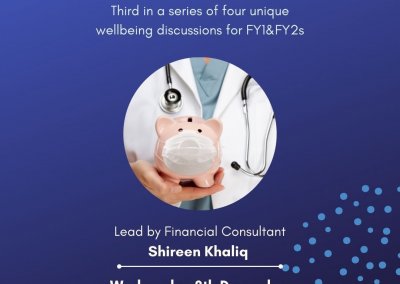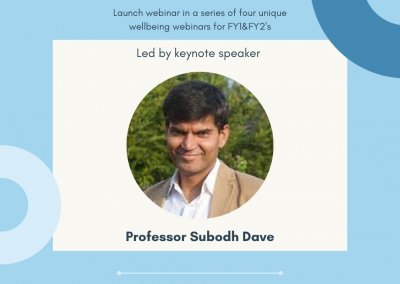Doctors in Distress, a charity dedicated to reducing stress and burnout in healthcare workers, received £20,000 from the Wesleyan Foundation to support their wellbeing webinars for foundation doctors.
Doctors in Distress was founded in 2018 by Amandip Sidhu after the suicide of his brother, cardiologist Dr Jagdip Sidhu, he wanted to ensure every doctor does not feel like suicide is the only option when stressed or burnt out with the pressures of work. Susannah Basile, Head of Programmes at the charity, shared:
“In the NHS there’s a huge stigma around talking about mental health, especially with this doctor-carer mentality of ‘I care for people, I don’t need to be cared for’, throw in a pandemic and you’ve got a lot of quite ill mental-health in the NHS.
“We wanted to provide foundation doctors with training on why it’s important for them to look after their own wellbeing and understand that by looking after their own wellbeing they’ll break the cycle when they become consultants and there won’t be this culture of not prioritising the mental health of their team, we want to have a healthy NHS.”
The funding from Wesleyan has enabled Doctors in Distress to run four webinars on different issues that may affect the mental wellbeing of a foundation doctor. Susannah explained:
“Foundation doctors are fresh out of medical school being thrown in the deep end where everything is alien, on top of that there’s a pandemic going on, we’re seeing quite a few stats out there about how foundation doctors are really mentally struggling at the moment.
“We want the webinars to encourage participants to talk, our first panel discussion, ‘Self-care is health-care’. The second webinar ‘Navigating the bumps in the road’ and another webinar on Financial Wellbeing and with Wesleyan being a financial organisation they’ll be sharing financial tips and why it’s good to look after finances for your mental health.”
Dr Helen Garr, Medical Director Designate NHS Practitioner Health, shared why she wanted to work with Doctors in Distress by hosting one of the wellbeing webinars:
“When I was a junior doctor my baby son was sick and spent a lot of time in hospital. I worked while he was in hospital as I didn’t want to let my team down and I felt I could not go off sick. No one asked how I was and no one suggested I be off work to be with my son. In other areas, I worked with amazing colleagues and seniors who really cared about me and my son, insisting I take time off, I’ll never forget their kindness or the difference it made.
“I’ve seen doctors on their knees overwhelmed and exhausted. I’ve attended five funerals of doctor friends and colleagues who died by suicide. I asked myself, in this caring profession we all work in, who cares about the doctors? How do we change things, so we care about each other?
“These questions are my purpose. They drive everything I do in my career, particularly within my role at NHS Practitioner Health and my reason for of course wanting to support this webinar for Doctors in Distress.”
Susannah continued:
“We’re so grateful to Wesleyan because foundation doctors are such a hard bunch of people to reach, and these webinars are really helping to initiate and continue these lifesaving conversations.”



